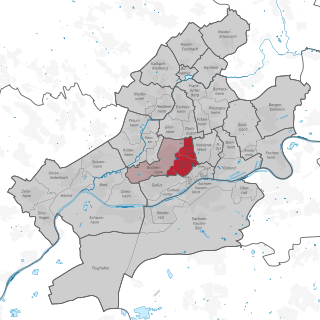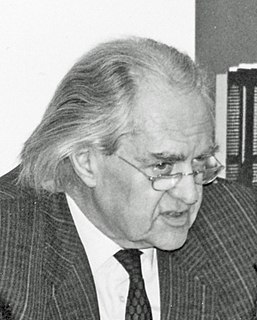
The Philanthropin (Greek for "place of humanity") is a Jewish elementary school and gymnasium in Frankfurt, Germany. It was founded in 1804 by Mayer Amschel Rothschild.

The Philanthropin (Greek for "place of humanity") is a Jewish elementary school and gymnasium in Frankfurt, Germany. It was founded in 1804 by Mayer Amschel Rothschild.
Formally, the school was established by Siegmund Geisenheimer, the chief accountant of Mayer Amschel Rothschild, with Rothschild's support. The school was supported financially by the government and was from the start also open to non-Jewish pupils.
The school's motto was "for enlightenment and humanity." The school became a prominent centre of liberal Judaism in the 19th century; many of its teachers were active in the Jewish reform movement. [1] In the late 19th century the school started to experience economic difficulties due to the fact that Jewish parents increasingly sent their children to non-religious public schools, and the Jewish community spent more than half of its budget on the school. The current school building was built in 1908. The school experienced a new golden era during the Weimar Republic under the leadership of Otto Driesen. At its peak it had around 1,000 pupils. The high school remained open until April 1941, while the elementary school had to close in June 1942. [2]
From 1954 the former school building served as offices for the Jewish community. In 1966 it was proposed to reopen the school, but the proposal failed. In 1978 the Jewish community decided to sell the building to the city to finance a new Jewish community centre in the Frankfurt West End. The building was then used by the city as a public community centre and was renovated during the 1980s. From 1986 to 2004 it was the seat of the Hoch Conservatory and was additionally used by a theatre company. In 2006/2007 the building became the seat of the I. E. Lichtigfeld-Schule, a Jewish school founded in 1966. The school is now commonly referred to as the Philanthropin. [3]
The school currently has around 400 pupils. Around two thirds have a Jewish background. The Philanthropin is a neighbour of the Musterschule, a noted progressive gymnasium, which is found on the other side of Eckenheimer Landstraße.

Mayer Amschel Rothschild, was a German Jewish banker and the founder of the Rothschild banking dynasty. Referred to as a "founding father of international finance," Rothschild was ranked seventh on the Forbes magazine list of "The Twenty Most Influential Businessmen of All Time" in 2005.

Westend-Nord and Westend-Süd are two city districts of Frankfurt am Main, Germany. The division into a northern and a southern part is mostly for administrative purposes as the Westend is generally considered an entity. Both city districts are part of the Ortsbezirk Innenstadt II.

Heusenstamm is a town of over 18,000 people in the Offenbach district in the Regierungsbezirk of Darmstadt in Hesse, Germany.

Königstein im Taunus is a health spa and lies on the thickly wooded slopes of the Taunus in Hesse, Germany. The town is part of the Frankfurt Rhein-Main urban area. Owing to its advantageous location for both scenery and transport on the edge of the Frankfurt Rhine Main Region, Königstein is a favourite residential town. Neighbouring places are Kronberg im Taunus, Glashütten, Schwalbach am Taunus, Bad Soden am Taunus and Kelkheim.

The 'Huguenot city' of Neu-Isenburg is a town in Germany, located in the Offenbach district of Hesse. It is part of the Frankfurt Rhein-Main urban area and has a population of 35,472 (2007). The town is known nowadays mainly for its regionally used shopping centre, the Isenburg-Zentrum (IZ), the Hugenottenhalle, the Hotel Kempinski Frankfurt, the Autokino Gravenbruch, the Sportpark, the Waldschwimmbad and not least of all its central location near Frankfurt Airport.

The Frankfurter Judengasse was the Jewish ghetto of Frankfurt and one of the earliest ghettos in Germany. It existed from 1462 until 1811 and was home to Germany's largest Jewish community in early modern times.

Baron Amschel Mayer von Rothschild was a German Jewish banker of the wealthy Rothschild family.

Friedrich Karl Waechter was a renowned German cartoonist, author, and playwright.
Theodor Creizenach was a German Jewish poet and historian of literature. He was the son of Michael Creizenach.
Dr. Hoch's Konservatorium – Musikakademie was founded in Frankfurt am Main on 22 September 1878. Through the generosity of Frankfurter Joseph Hoch, who bequeathed the Conservatory one million German gold marks in his testament, a school for music and the arts was established for all age groups. Instrumental to the foundation, prosperity and success of the conservatory was its director Joachim Raff who did most of the work including setting the entire curriculum and hiring all its faculty. It has played an important role in the history of music in Frankfurt. Clara Schumann taught piano, as one of distinguished teachers in the late 19th century, gaining international renown for the conservatory. In the 1890s, about 25% of the students came from other countries: 46 were from England and 23 from the United States.
The House of Bethmann and the House of Rothschild were the two banking dynasties of Frankfurt am Main. For several decades their affairs were closely intertwined while involved in a rivalry. On occasion they would cooperate—as business partners but also, not least thanks to the pro-emancipation outlook of Simon Moritz von Bethmann, with the shared goal of enfranchising the Jews of Frankfurt.

The Jewish Museum Frankfurt am Main is the oldest independent Jewish Museum in Germany. It was opened by Federal Chancellor Helmut Kohl on 9 November 1988, the 50th anniversary of Kristallnacht.

Hilmar Hoffmann was a German stage and film director, cultural politician and academic lecturer. He founded the International Short Film Festival Oberhausen. He was for decades an influential city councillor in Frankfurt, where he initiated the Museumsufer of 15 museums, including the Jewish Museum Frankfurt. He was the president of the Goethe-Institut and taught at universities such as Bochum and Tel Aviv. He wrote the book Kultur für alle, which was a motto of his life and work.

F. W. Bernstein was a German poet, cartoonist, satirist, and academic. He worked for the satirical biweekly pardon. After teaching at schools, he was professor of caricature and comics at the Berlin Academy of the Arts from 1984 to 1999. He was one of the founding members of the Neue Frankfurter Schule, which published the satirical magazine Titanic.

The Old Jewish Cemetery of Frankfurt is located at Rat-Beil-Straße directly adjacent to the oldest parts of the gentile Frankfurt Main Cemetery. Together, Frankfurt Main Cemetery, the Old Jewish Cemetery and the New Jewish Cemetery constitute one of the largest cemetery areas in Germany. The Old Jewish Cemetery is noted for many monumental graves and includes the graves of many notable individuals. The Old Jewish Cemetery is the largest of Frankfurt's twelve Jewish cemeteries.

The Musterschule is a gymnasium in Frankfurt. It was founded on 18 April 1803 by Wilhelm Friedrich Hufnagel as a Realschule and is Frankfurt's second oldest higher school after the Lessing Gymnasium. It received the name Musterschule due to being an experimental and progressive school based on Johann Heinrich Pestalozzi's educational ideas. In accordance with this tradition, the school has been named a "center for music education and gifted education" by the Hessian ministry of culture. Since the 19th century, it has been renowned throughout Germany and abroad as a progressive Realgymnasium. The Musterschule is a neighbour of the Philanthropin, the renowned Jewish school founded by Mayer Amschel Rothschild, which is found on the other side of Eckenheimer Landstraße.
There is a community of Japanese people in Germany consisting mainly of expatriates from Japan as well as German citizens of Japanese descent.

The Maingau Clinic of the Red Cross is a clinic in Frankfurt, Germany, which is run by the German Red Cross. It is located near the Eschenheimer Anlage park in central Frankfurt, with the address Scheffelstraße 2–14.

Rothschild Park is a public park in Frankfurt, Germany. It is located within the central business district known as the Bankenviertel, to the north of the Opera Tower, adjacent to the Opera Square. The park is named for the Rothschild family, a banking family originating in Frankfurt.

Helene Adler was a German Jewish educator, writer, and poet.